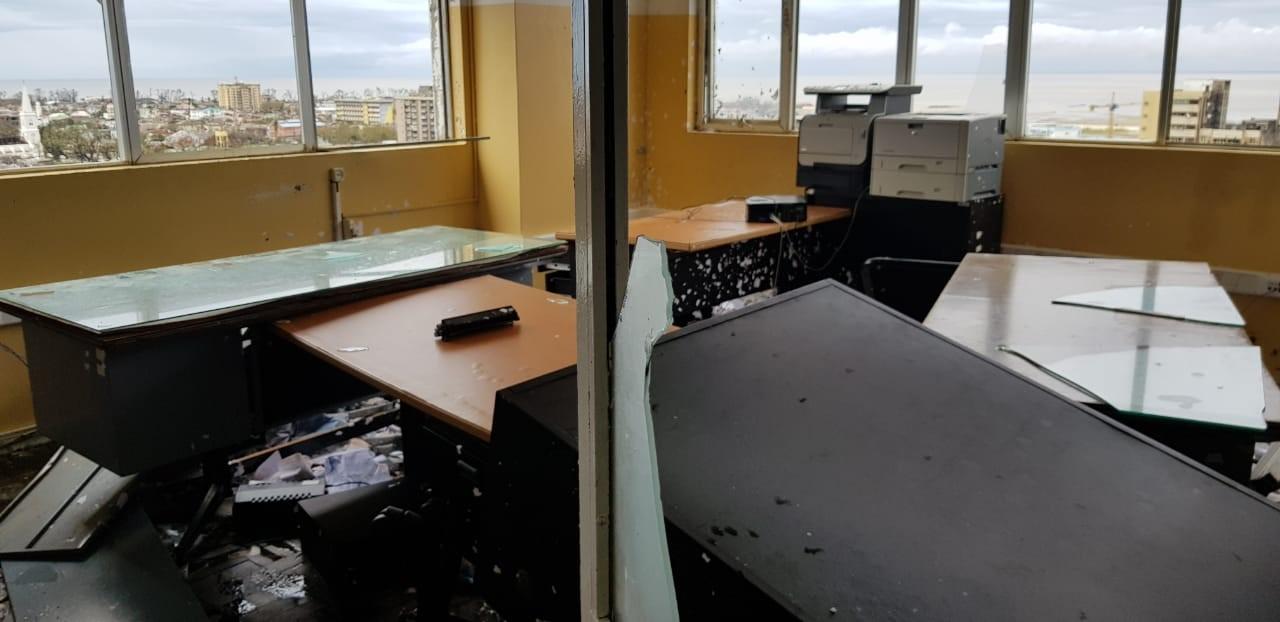Mozambique: A year later: slowly recovering from Idai cyclone, but shielding from Covid-19
By Evert WAETERLOOS, Enabel Maputo
On March 15th last year, a major humanitarian crisis hit Mozambique.
Cyclone Idai brought heavy rains and floods to the provinces of Tete, Manica, Niassa,
Zambezia and Sofala, and destroyed most of the city of Beira (see Van de
Velde, A. and E.Waeterloos ‘Climate and energy crises in Mozambique: time to
refuel the debate?’ on open.enabel.be April 2019). Mozambique and
Belgium have ongoing collaboration projects in capacity building for
sustainable access to energy, with an emphasis on renewable and decentralised
energy for rural areas in the provinces of Zambezia, Manica and Sofala.
Partners are the Ministry of Mineral Resources and Energy (MIREME), selected
Provincial Directorates of Mineral Resources and Energy (DIPREME), the new
National Energy Regulatory Authority ARENE, and the Energy Fund FUNAE. Idai
caused significant damage to the DIPREME offices in the cities of Beira (Sofala)
and Chimoio (Manica); windows and roofs were blown away causing considerable
water damage to the IT Equipment. To support MIREME at national and provincial
level in its reporting and planning tasks, Enabel responded positively to the
request to replace the necessary equipment in both provincial DIPREME offices,
and to improve the internet connectivity between the central and provincial
offices. This support was also deemed urgent, as it provides the basic
infrastructure for the presently ongoing financing of an integrated country-wide
IT platform for energy data management in MIREME.
In collaboration with the IT technicians of MIREME, appropriate
equipment and services were identified, assessed and sourced through public
procurement. All IT material was eventually sourced through local suppliers.
These face sometimes challenges with stock and foreign exchange management, as
well as security risks with transport, as threats of armed attacks along the
main highway linking Maputo with the central provinces resurface
regularly. In addition, setting up all
systems locally proved to be a challenge as well. Building repairs in the
provincial offices took place at the same time, as the necessary budget
allocations from central government were delayed. And as local DIPREME internet
capacity failed for the installation of software downloads, a solution was found
in temporarily borrowing the project modem from Enabel. However, in the end and
unfortunately later than planned, all equipment was delivered and installed as
designed by the partner’s technical team, and are now able to run promising IT
applications for improved communication and reporting in the near future.
With the promised aid for recovery from last year’s Idai disaster trickling
in only very slowly from different corners, Mozambique is facing a new
disaster. Because of the Covid-19 pandemic, a state of emergency of 30 days has
been declared as from April 1st.
The state of emergency intends to restrict movements to reduce
transmission of the disease, which at present stands at 10 officially confirmed
cases out of around 360 tested. While this is not yet a full lockdown, there is
an intense debate of the possible impact on livelihoods of a total lockdown such
as the one in neighbouring South Africa with 1655 confirmed cases and 11 deaths.
With the degree of poverty and informal or low-grade urbanisation prevailing in
Mozambique, most people live from day-to-day without money or food reserves, in
self-built houses, in close vicinity of each other, and without access to proper
water and sanitation. This renders the idea of a preventive forced isolation
unfeasible. Unless it is accompanied by extraordinary compensatory public
services and costly crisis measures. However, the alternative of the same poor households
having to cope with an exponential growth in sick and dying people because of a
weak health system - with an officially reported 22,000 test kits available
only - is equally undesirable. The delayed release of the Government of
Mozambique’s new 5-year plan 2020-2024 has allowed a last-minute inclusion of
additional management and resilience promotion activities in view of the
increased risk of natural and man-made disasters. At a meeting with donors last
week, government asked for US$703 million to fight Covid-19. However, part of it
is requested as budget support and the majority of the resources are earmarked
for the construction of district hospitals promised during last year’s election
campaign. The resumption of budget support is not likely since donors stopped it
in 2016 when secret public debts to the tune of US$2 billion were revealed. Hence,
additional or ahead of schedule-financing of the common fund for the health
sector PROSAUDE - of which Enabel manages technical assistance in Public
Finance Management financed by Flanders - is a valid alternative being considered.
Meanwhile, the promotion of emergency measures in the formal public and work places
is necessary to reduce the risk of a rapid spread of the pandemic. However, it
is clear that in the case of disasters such as these, Mozambique’s poor
populace is again caught between a rock and a hard place. Their precarious
livelihoods do unfortunately not leave much room for increased risk aversion
practices. These are reminders that
development cooperation needs to address both emergency situations as well as the
structural causes of inequality in the face of such emergencies.
Latest news from this project
No news

